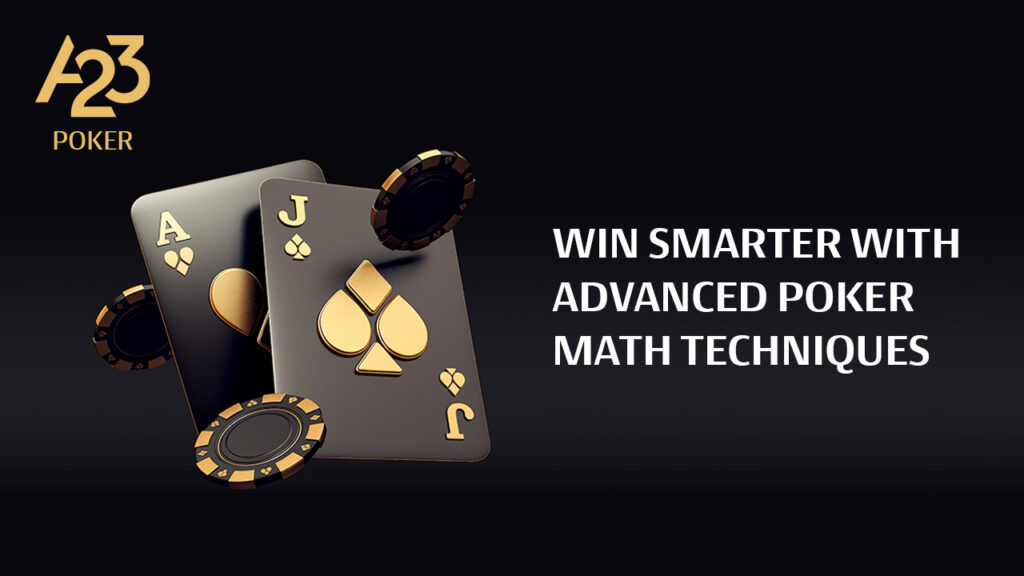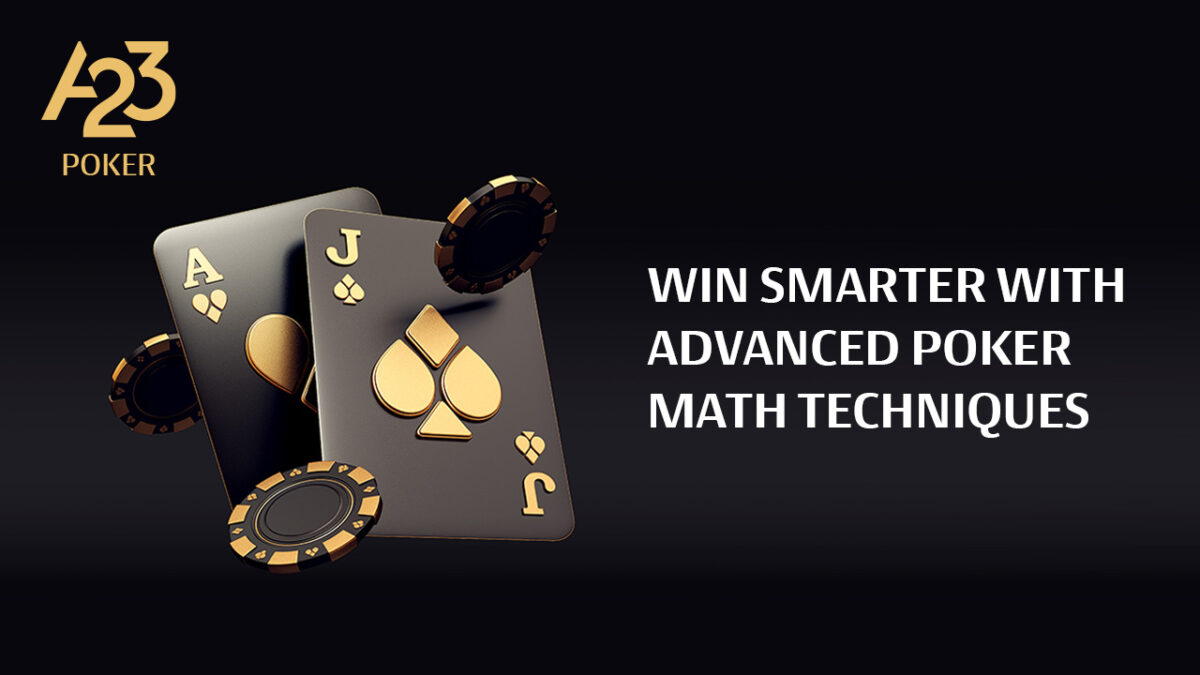
Winning in poker becomes easier when you learn to use poker math as and when required. For example, using ratio or percentage calculation can take you a long way. You can calculate the chance of getting your desired card in the next deal using mathematics. Beginner or pro-poker math always stands by you like a true friend in need. Just make sure that your calculation is right.
When you cannot decide if you should call or fold, pot odds can help. Implied odds are an extension of pot odds; they tell you your probability of winning after you draw. In the following discussion, you will learn about concepts and different applications of pot odds, implied odds, expected value, and more.
Understanding Pot Odds
Let’s understand the concept of pot odds in more detail.
What Are Pot Odds?
Pot odds are calculating the odds of getting the card you want versus the cards you don’t want. If you can manage to calculate correctly, the risk you take is calculative risk, which is better for risk management.
When you calculate pot odds, you need to remember that a correct calculation will help you win. Besides, it helps you avoid taking unnecessary risks. When you limit taking unnecessary risks, you increase the joy of winning the hand.
How to Calculate Card Equity and Pot Odds
When calculating pot odds for the present pot, you need to consider different factors like the cost of the call, the total pot size, and card equity. If you find the card equity is greater than the pot odds, then only you should call.
Let’s understand what card equity and pot odds are.
Card equity
Suppose you have two hole cards: Seven of Spades and Nine of Diamond.
Three community cards are also there on the table: Six of Hearts, Eight of Clubs, and Ace of Diamonds.
Now, there are 4 fives and 4 tens that can help you make a straight. So in total, there are 8 out cards or cards that help you make the desired hand.
To find out the percentage of out cards, you need to multiply the out cards’ number by two and add one: (8*2) + 1 = 17% (Card Equity)
The percentage of card equity will help you determine your move for the round. But you need the pot odds in percentage as well. Let’s find that out.
Pot Odds
It will be easier for us to calculate its formula if we consider the example of chips. Suppose your opponent has added 30 chips to the pot, making it a total of 120 chips. So you have to add 30 chips as well to win 120 chips. We can find out that 30 chips are 25% of 120, the total pot size.
If you compare card equity (17%) and pot odds (25%), you see that the latter is higher. In this situation, you should fold because you have less chance of winning the pot.
When to Use Pot Odds in Decision Making
In critical situations when you have a big pot size and you need to decide if you should call, raise, or fold, use poker game mathematics.
Look at the example provided in the above section to better understand the situation when pot odds can help you.
Delving into Expected Value (EV)
The number of chips that you may win or may get reduced is determined by EV in the poker game. You may decide to call, raise, or even fold based on the positive or negative value of the factor.
Wondering how to play poker games with mathematics? EV is the calculation that you must learn to keep winning chips. The calculation will help you determine the positive or negative probability of winning chips.
Poker odds give you a probability to win, while expected value gives you a positive or negative value to decide in the long run.
Let’s calculate EV to help you better understand it.
Calculating Expected Value (EV)
Suppose your opponent has added 50 chips to the pot, making it 150 in total. If you want to win, you have to add 50 more chips. Now let’s assume the probability of hitting a flush on the river is 20% and missing the chance of hitting the flash is 80%.
The calculation for EV will be
Possibility to hit flush + Possibility to miss flush
EV= (150*0.2) + (-50*0.8)
= (30) + (-40)
= -10
So, you can see that each time you call to hit flush, you will lose 10 chips. This is a losing situation and you should fold.
Using EV to Evaluate Different Plays
You can use the concept of Expected value in different scenarios of poker. You only need the calculation for the probability of making the best hand out of all the community cards and hole cards.
If you want to assess if a particular strategy has a positive or negative EV value, you need the total number of chips to add and the probability of winning. Besides, you also need the probability of hitting the best hand and missing the best hand.
Advanced Poker Math Concepts
Now let’s look at some more complex mathematical concepts for poker.
Implied Odds vs. Pot Odds
The main difference is that the former tells you the probability of winning a hand when drawing. While the latter tells you if you should raise after you make a draw.
The implied odds may not provide you with the exact number that you are likely to win, but they give a number that you should extract from your opponent to win.
The formula for implied odds is subtracting pot odds from the odds of draw.
Reverse Implied Odds
It is exactly the opposite of its counterpart. How much you are likely to lose after you hit a draw is expressed by the reverse implied odds.
In a situation where reverse implied odds suggest that if you make the move, other opponents can make a better hand or flush. In that case, you are likely to lose money; hence, fold is the right option for you.
Equity in Poker
Equity in a poker sequence or poker game denotes a percentage value of the total pot size you are likely to win.
On the other hand, Expected Value is a negative or positive value. It tells you if you are going to be profitable or lose chips if you make a decision.
The equity value helps you to improve your chance of gaining more chips and increase the thrill of playing poker.
Practical Applications and Strategy Tips
If you want to ace the poker game, you must understand the mistakes made by players during the play.
When to Apply Advanced Math Concepts
You can play poker using poker math and improve your chance of winning every time. The best way to improve your skill in poker math is to play in the practice games. The more practice games you play, the sharper your mathematics skills become.
Thereafter, use mathematical calculations in real games.
Intuition plays a significant role in the poker game. There are some moments when our intuition gives you the best advice. Follow your instinct with a calculated approach to back them up. This way, you can increase the chance of winning the game.
Common Mistakes to Avoid
How to play a poker game like a pro? In short, you must avoid mistakes during your gameplay. Keep in mind the following mistakes to avoid them during the game.
- Never start with a poor hand – When you play a game of poker, you must start with a strong hand. If you start with poor hands, expect to get poor results.
- Raise with strong hands – If you have strong hands, raise fearlessly. If you hesitate to raise, your opponent might get the chance to outplay you.
- Be aware of opponents’ table image – Playing the game of poker requires you to understand your opponents’ table image. It means you have to be aware of the gameplay style of your opponents. Choose to call, raise, or fold based on your opponent’s table image.
- Always pay attention – Playing poker requires sound observational power. Don’t just relax when you finish your hand. Observe your opponent—see their body language, their expression, and many more. Something informational might come up to help you with your gameplay.
Conclusion
Poker math calculations are a very helpful tool for winning the game. To play like a pro, you must understand the differences and applications of pot odds, equity, implied odds, or expected value.
While pot odds give you an idea of the profitability of making a move, the expected value gives you an idea of a possible gain or reduction in the number of chips.
If you master the mathematical calculation of poker, it will help you win poker in the long run.
Whether you are a pro or a beginner, continuous practice and playing real games help you become a master of your trade.





 Mar 27, 2025
Mar 27, 2025
Note: that your message will not be displayed until it is reviewed by the moderator!